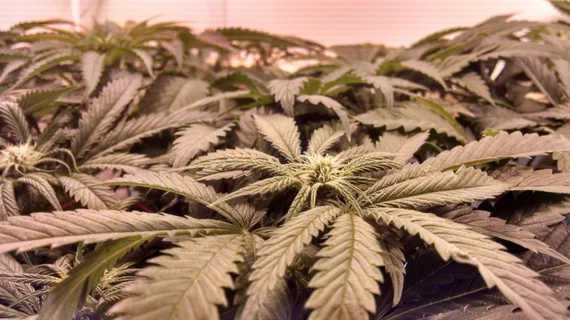How recent marijuana use impacts PCI outcomes
Patients with a history of recent marijuana use who undergo percutaneous coronary intervention (PCI) may face an elevated risk of cerebrovascular accidents (CVA) or bleeding, according to the results of a new study published in JACC: Cardiovascular Interventions.
Researchers analyzed data from the Blue Cross Blue Shield of Michigan Cardiovascular Consortium PCI registry. All patients were treated from January 2013 to September 2016. Out of a total of 113,477 patients, 3,970 reported using marijuana.
“We compared post-PCI in-hospital outcomes between patients with and those without recent reported marijuana use,” wrote first author Sang Gune K. Yoo, MD, with the department of internal medicine at the University of Michigan in Ann Arbor and colleagues. “All in-hospital outcomes were assessed during the index hospitalization when PCI was performed. The primary in-hospital outcomes included death due to any cause, cerebrovascular accident, acute kidney injury, transfusion, and bleeding.”
Patients who reported marijuana use had a younger mean age (53.9 years old) than those who did not (65.8 years old). These patients were also more likely to consume tobacco and more likely to present with STEMI—but less likely to have cardiovascular comorbidities such as diabetes and hypertension.
Also, patients who reported marijuana use had a significantly higher rate of post-PCI bleeding (5.1% vs 3.5%) and lower rate of post-PCI acute kidney injury (AKI) (2.3% vs 3.4%). The team found no significant differences in the rates of some other post-PCI complications, including stroke (0.3% vs 0.3%), transfusion (2.3% vs 2.6%), and death (1.3% vs 1.6%).
When patients were matched 1:1, the team found that those who used marijuana had substantially higher risks for bleeding (5.2% vs 3.4%) and CVA (0.3% vs 0.1%). Again, there was a lower risk of AKI (2.2% vs 2.9%). There were no significant differences reported in the risks of transfusion and death.
"Despite the uncertainties surrounding use of marijuana, approximately 3% to 4% of patients presenting for PCI report recent marijuana use," the authors concluded. "As these estimates may be subject to underreporting, the potential cardiovascular population at risk could be substantially higher. Especially as marijuana use continues to increase in the state of Michigan, and elsewhere, clinicians and patients should be aware of the increased risks for post-PCI complications in patients with marijuana use. The periprocedural time frame around PCI thus represents a window of opportunity for screening and counseling related to marijuana use."
The full study is available here.
